Meal prepping is the hottest food trend lately, and frankly, I couldn’t be happier! I’ve been meal prepping for years simply because it’s a great way to save time, money, and reduce waste in the kitchen, so I’m happy to see so many people getting wise to this method. But there are still so many people who haven’t had the meal prep “Aha!” moment, so I wanted to do a quick Meal Prep 101 to help people grasp the concept or get over the intimidation to give it a try.
How to Meal Prep
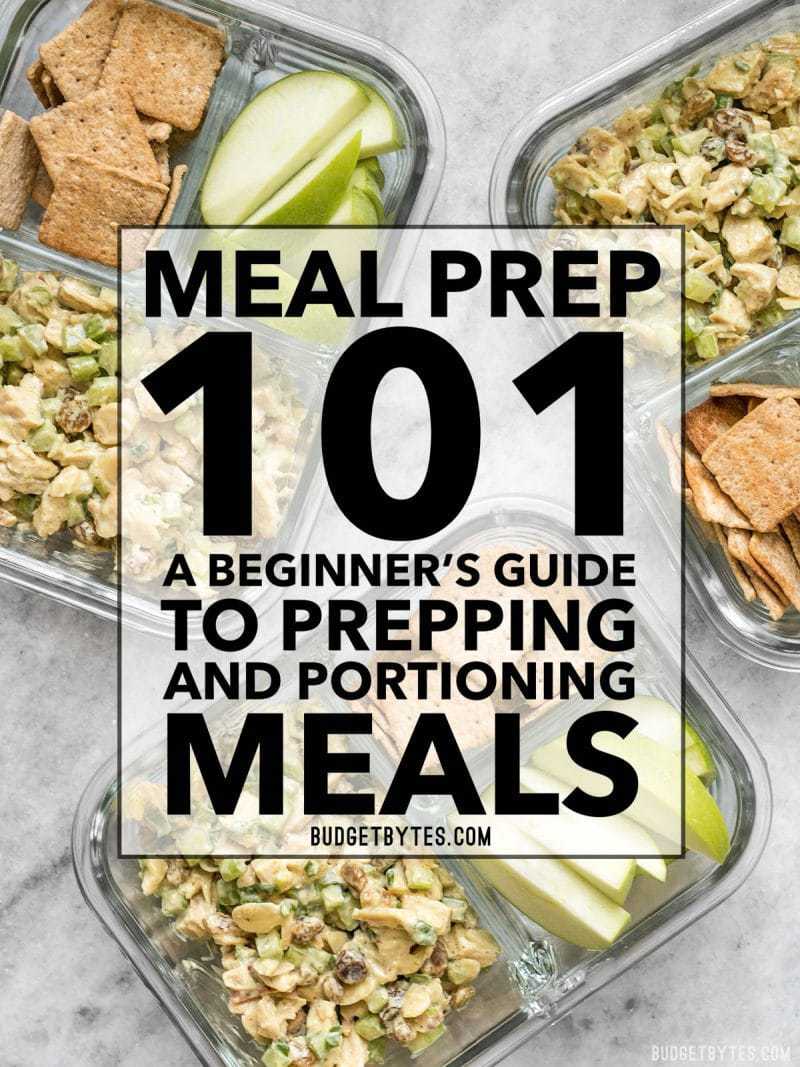
All recipes are rigorously tested in our Nashville Test Kitchen to ensure they are easy, affordable, and delicious.
What is Meal Prepping?
Meal prepping is simply the act of preparing a meal or recipe, then portioning it out to create grab-and-go meals for later. If you’ve ever packed up your leftovers from dinner to take with you for lunch the next day, then you’ve already mini-meal prepped! Generally though, meal prepping refers to preparing 3-7 days worth of food at a time.
Think of it like packing your lunches for the week all at once instead of packing your lunch each morning. You can use this same technique for breakfast, lunch, dinner, and snacks.
Why Meal Prep?
Meal prepping is convenient, efficient, reduces waste, and reduces temptation to eat outside your plan (whether the plan be a diet or a budget). When cooking every single day is out of the question, meal prepping can allow you to still eat home-cooked meals without having to dedicate time each day to preparation.
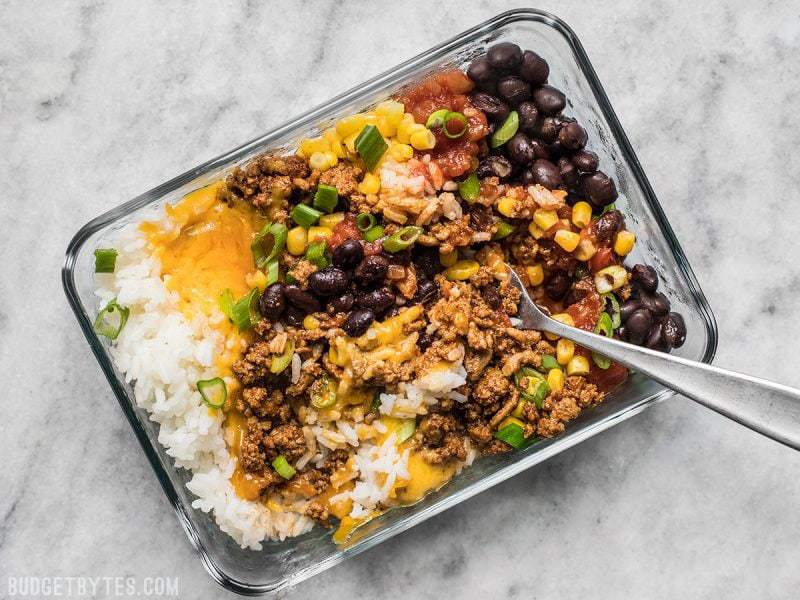
Who is Meal Prepping For?
Meal prepping is not for everyone. It is good for people who value convenience and efficiency more than variety. With meal prepping you generally eat the same thing for a few days in a row, so if you don’t like leftovers or get bored with food easily, meal prepping is not for you. If having control over what you eat, or maximizing your time or budget is more valuable to you than eating something different every single day, meal prepping is your ticket.
I’ve generally only seen people meal prep for themselves or maybe one other person, as opposed to a whole family. Meal prepping for a whole family would be quite difficult because there are more people to please and would require a million containers.
What Can I Meal Prep?
This is the golden question. As with any leftovers, the palatability of prepped meals varies from person to person.
Foods that work well for meal prepping:
- cooked grains & pasta
- cooked beans
- cooked meat
- roasted vegetables
- hearty fresh vegetables (think celery, carrots, peas, bell peppers, kale, cabbage, radishes, etc.)
- whole fruit (apples, oranges, stone fruit)
- nuts & seeds
- cheese
- sauces and dips (like salad dressings, hummus, salsa, sour cream, etc.)
Foods that don’t usually meal prep well:
- softer fruits and vegetables (lettuce, berries, and cut fruit)
- crunchy items like fried food, crackers, or chips
That being said, there are sometimes ways around this, like packing ingredients individually. I tend to stay away from items that require special care just for convenience sake, but it is possible to prep these things if you don’t mind putting in the extra work.
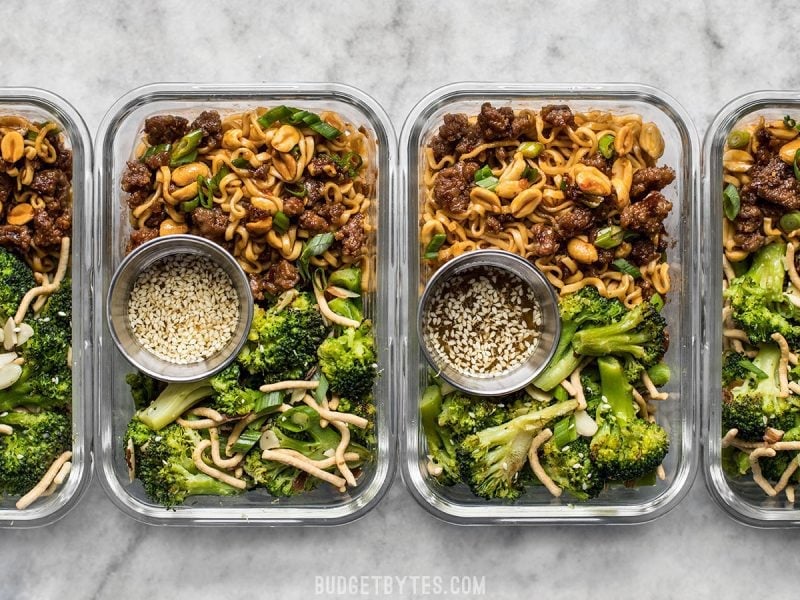
How Long Do My Meal Preps Stay “Good”?
I get this question on almost every meal prep post I make and unfortunately there is no one hard rule here. As food is stored in the refrigerator it begins a slow decline in quality. In addition to this, the way food is packed or the individual nuances of your refrigerator environment can impact the quality of your refrigerated meals. So often the lifespan or acceptable changes in texture and flavor will be subject to the eater.
Always begin with the refrigeration guidelines set by the FDA, and then evaluate them against your own preferences. In general, I don’t like to prep more than four days worth at a time because I find that by that fifth day the food is usually too limp and lifeless to enjoy. By prepping four days in a row I can prep two times per week and be covered or prep once per week and reach into my stash of freezer leftovers for the remaining days (plus the option for eating out one day).
How To Start Meal Prepping
Start SMALL. I can’t emphasize this enough. Start by packing up your leftovers from dinner one night and taking them for lunch the next day. Once you’re comfortable with that and you get to know what types of food you like as leftovers (pay attention to texture changes that might bother you), you can pick one recipe to prep for the week ahead.
I suggest starting with a single recipe meal prep instead of a meal that requires two or three recipes together. Single recipe meal preps provide your protein, grain, and vegetables all in one recipe, so there is no need to make a side dish.
Once you get a hang of one recipe or meal, you can try two (like lunches and dinners) or try prepping your breakfast ahead. The most important thing is that you prep for the level that works for you. If you try to prep three meals for five days all at once and find that after day three you just won’t eat the same thing anymore, don’t risk wasting the food. Prep only three days. Personally, I like to do just lunches, or sometimes breakfast and lunch, leaving my dinner to be my variety for the day.
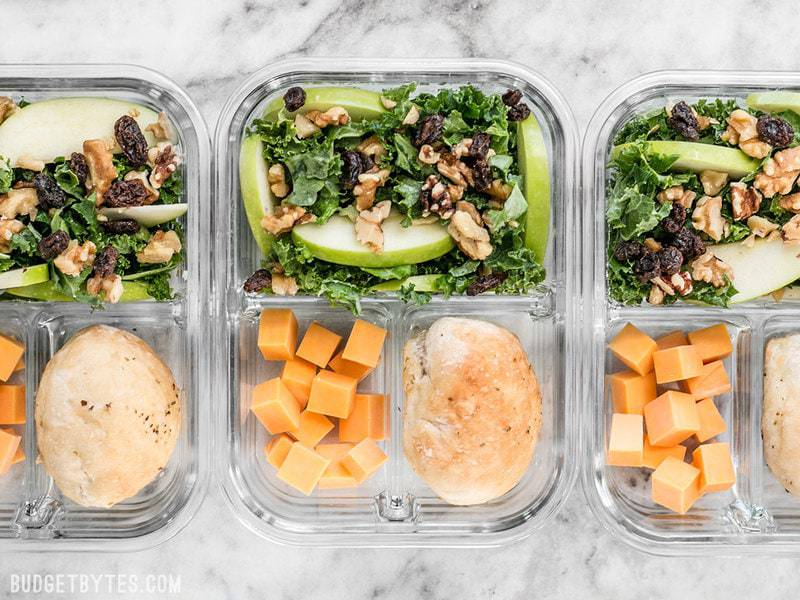
My Meal Prep Formulas:
An easy way to think about meal prepping is to make a formula out of it. When deciding which foods to meal prep I try to pick out one of the following formulas:
- Basic: Protein + Grain + Vegetable
- Low Carb: Protein + Vegetable + Vegetable
- Vegetarian: Legume + Grain + Vegetable
You can add toppings to any of the formulas above to make it more interesting, like sauces, nuts, seeds, croutons, etc. Or just keep it simple and make life easy!
What Do I Need?
Containers. Containers of different shapes and sizes. And don’t worry, you can start small here too.
I started by buying one pack of the blue-top reusable plastic Ziploc containers per week. They’re BPA free and can go in the freezer, dishwasher, and microwave, which makes them super convenient, plus they’re very inexpensive and come in several shapes and sizes.
Once my budget allowed, I graduated to glass containers. My favorite glass containers so far are the plain, single compartment Pyrex containers (I like the 3-cup rectangle and 4-cup bowl). I do also have some divided glass containers that have separate compartments, but I find their use a little more limited because not all food can fit in the smaller compartments and the compartment dividers aren’t leak proof.
Metal bento box style containers are also great, as long as you’re packing a cold meal and won’t need to reheat it in a microwave.
Fold top sandwich bags or zip top bags can also be helpful when you need to separate ingredients. And, if you like to keep your dressing and dips separate, look for 1-2 oz. size resealable containers (I’ve seen several at grocery stores and on Amazon).
Ready to Get Started?
Check out our Meal Prep Category for lots of meal prep inspo! I create new meal prep ideas fairly regularly, so check back often and don’t forget to sign up for our newsletter to stay on top of all the new recipes and ideas! Also check out our Vegetarian Meal Prep, Breakfast Meal Prep, and No-Reheat Meal Prep categories!
Share Your Meal Prep Wins
We can all learn from each other, so share your tips, tricks, and meal prep wins in the comments below! I’d love to hear what you do and what you’ve found that works and your creative meal prep hacks!


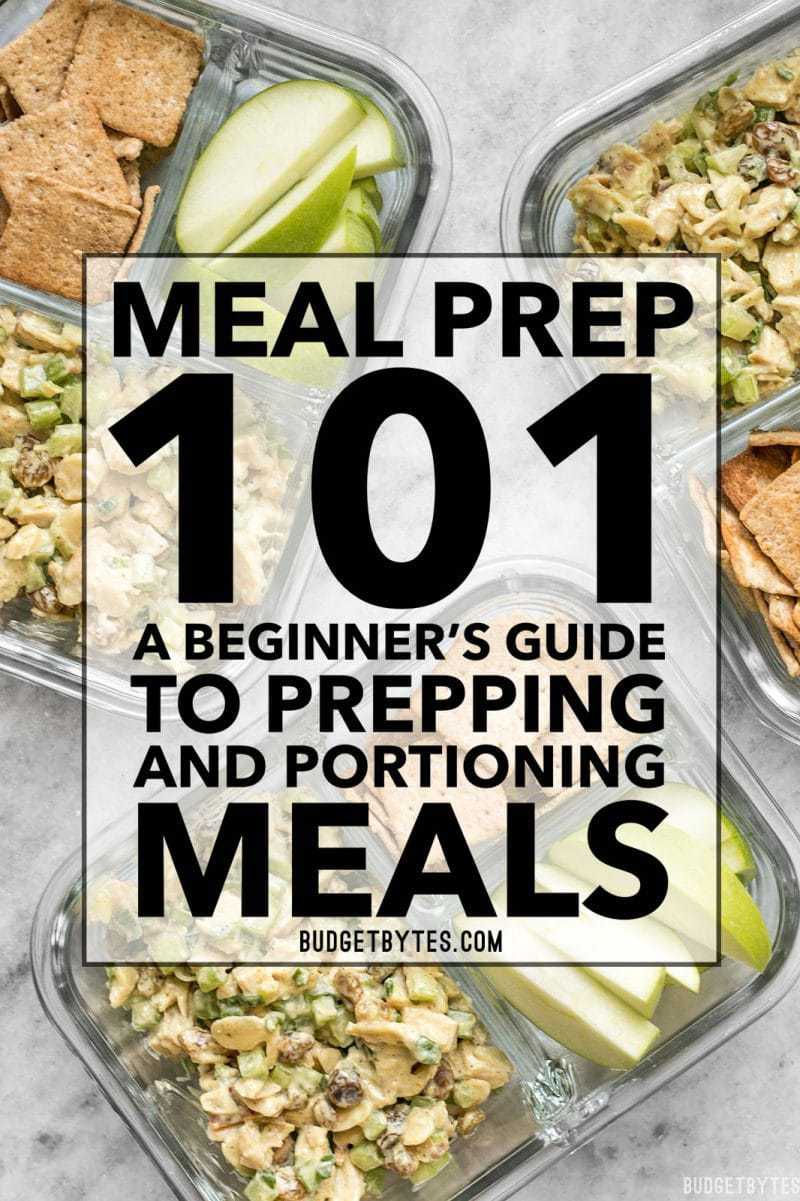
Very helpful; I have 1 client and I have been catering for years. This really gave me some direction & I’m going to seek out more. Thanks
Can you meal prep for one person?
Can you meal prep for three people
I Love prepping as I am a busy Mum of 3 teens who also works full time. Speed, ease , budget and nutrition are important to me. Loving your recipes, super easy and delicious!
This is not my definition of meal prepping. For me, meal prepping means prepping the ingredients for the meals I’ll make all week. I don’t make the full meals, then make myself little homemade Lunchables… I’ll cut and prepare meat, vegetables, etc. before the cooking part. That way, when I’m cooking dinner on a Wednesday, I just have to dump in one container of pre-chopped carrots or another container of pre-chopped chicken. That’s way more useful to me than Lunchable-making.
My ultimate goal is to save money & eat healthier on the go for my husband & I. We work different shifts and life is busy. Thanks in advance
I’m working with a wellness coach who is encouraging me t meal prep. I’ve always liked the idea but have been procrastinating about getting started. So, miss the time!
Great information for us beginners, so thank you, I feel more confident in my ability to learn how to prep smarter.
Ready to get prepping! I’ve been thinking about this for a long time just never got started.
Excited to get prepping this school year.
New at this new meal prep and I’m excited to actually try this .
Hello iam interested in food prepping plantnbase protein vegan meals
My food prep meals will be for health and wellness bodybuilders for fitness
And healthy meals for Beauty and Wellness to hydrate and replenish the body systems with wholesome meals.
Thank you for the intro. I’m considering diving into meal prep/batch cooking so that i can stick to the Autoimmune Protocol diet and then some sort of Paleo diet (gluten, soy and dairy free, at least). It would be great if there was a category for those receipes!
Thanks
Thank you for this incredibly thorough, yet concise breakdown. Much appreciated!
I look forward to food that is less processed, more real.